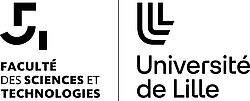Se former à des métiers d'avenir avec
la faculté des sciences et technologies
la faculté des sciences et technologies
L'Université de Lille propose une nouvelle offre de formation à la rentrée 2026.
Elle s'est dotée d'un nouveau portail, plus intuitif et ergonomique, afin d'améliorer la lisibilité de l'offre de formation. L'ensemble de l'offre de formation sera progressivement mise à jour dans ce nouveau catalogue.
Retrouvez dès maintenant les licences, DEUST et BUT sur https://formation.univ-lille.fr/
Retrouvez nos licences et nos Deust ici !
Les licences professionnelles, masters et la formation continue sont toujours consultables ci-dessous.
